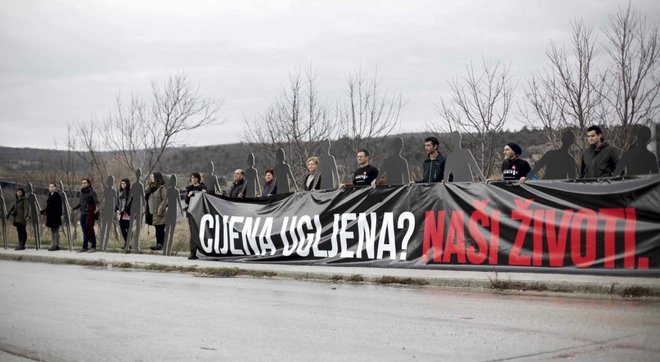On February 17th, activists formed a human chain in front of the coal power plant in Plomin in Croatia and hanged a banner saying: "The price of coal? Our lives".
- Organisation
- Activities
- Knowledge

On February 17th, activists formed a human chain in front of the coal power plant in Plomin in Croatia and hanged a banner saying: "The price of coal? Our lives".
Activists staged the action to demonstrate that coal is the invisible killer which brings suffering, diseases and death to people from both sides of the "coal chain" - in the distant Colombia, where coal exploitation directly threatens the survival of local Indigenous and Afro-Colombian communities, as well as in countries like Croatia and Italy where Colombian coal is used as a fuel for power plants.
By forming the international human chain, activist also emphasized the strength that comes from a joint fight against coal, like seen in Italy where citizens and environmental organizations managed to bring cases of coal power plants to court.
Activists from Green Istria, Green Action/FoE Croatia, Greenpeace, CEE Bankwatch Network, FoE Colombia and Re:Common, including local activist Mladen Bastijanić, and with the support of Labin Art Express, formed the human chain in Plomin. Silhouettes of people were also included in the chain as a symbol of the lives lost due to the use of coal.
Danilo Urrea from the Colombian organization CENSAT-Agua Viva/Friends of the Earth Colombia talked about the horrific consequences of coal exploitation in the coal mine El Cerrejon, located in the Colombian region La Guajira. During the last fifteen years, thousands of tons of coal from El Cerrejon were used in the thermal power (TP) plant “Plomin”.
“Companies that are in the business of coal exploitation lie when they talk about development of the regions surrounding the coal mine El Cerrejon. The truth is that on the territory of La Guajira children are dying because of thirst and hunger”, said Urrea.
In less than 30 years, coal companies, large-scale farmers and agricultural industry have polluted, privatized, imposed control and exhausted water resources of La Guajira. El Cerrejon alone uses 17 million liters of water per day only for road watering in order to minimise the dust left behind by passing trucks loaded with coal. At the same time, an average inhabitant of La Guajira drinks less than one liter of water per day. In these conditions of water scarcity, local communities are not able to produce food and live in a self-sustainable way as they used to.
Since the culture of Indigenous and Afro-Colombian communities emerged and consolidated around rich water resources and traditional agriculture, hens, sheep and cattle rearing and fishing, Urrea thinks that El Cerrejon is largely responsable for the water crisis and destruction of the culture of local communities.
“Water scarcity is one of the most important causes of environmental conflicts between local communities and corporations that exploit coal in El Cerrejon. Moreover, responsibility for this conflict also lies in the countries that import coal”, said Urrea.
Antonio Tricarico, representative of the Italian organisatio Re:Common, reflected on the successful fight of citizens and environmental organizations against a coal power plant in the Italian town Vado Ligure.
“Doctors finally started speaking up and revealing the causes of chronic diseases and deaths caused by coal power plants in densely populated areas, such as the one in Vado. Citizens organised and filled complaints to the authorities. This is how a state investigation of 86 persons started, including the power plant managers and public officials . The investigation ended recently and showed that they are responsible for an environmental disaster with fatal consequences”, explained Tricarico.
The beginning of the trial in Italy is expected soon, especially as the members of the Italian Parliament supported the results of the investigation, with a conclusion that in the case of Vado Ligureo, big corporate interests had been successfully putting pressure on the authorities, harming the interests of citizens of Vado Ligure.
Mladen Bastijanić, a well-known activist from Labin fighting the construction of TP “Plomin C” and opposing energy production from imported coal, also supported the protest action staged by environmental organizations.
“Bubić Jama is one of the highest quality water sources in the Labin area. However, this source supplies TP “Plomin”, and not the citizens of Labin. On the other hand, the Labin area gets water from sources in Raša valley, which are of far lower quality and under greater pressure from pollution. To provide the Plomin power plant with water of better quality and the people with water of lower quality is really a crime, and people who love their land would never let something like this happen”, said Mladen Bastijanić. Moreover, he believes that Croatia should produce energy relying on its own resources, respectively renewable energy sources, that won't be harmful to people and the environment.
“Recently, the Croatian Government announced a temporary moratorium on the construction of the new coal power plant “Plomin C”. We urge the Government once more to permanently abandon this harmful project because “Plomin C” would create the need for increased amounts of imported coal. Development that is based on coal is neither moral nor just”, said Dušica Radojčić from Green Istria.
You may upload our content in an integral or revised version with the indication of the organisation Zelena akcija/FoE Croatia - under the terms of the Creative Commons Attribution 4.0 International License.
This permission does not apply to stock photos and embedded content of other creators.
Design & development: Slobodna domena Zadruga za otvoreni kod i dizajn